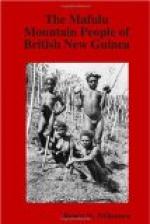In fact, concerning the whole question of ghosts, spirits, sorcery, charms, omens and superstitions, I cannot imagine that I have accomplished more than the mere touching of the fringe of it; and I am sure that, when the Mafulu people have got rather more into touch with civilisation, and become more accessible and communicative about these things, there will be much more to be learnt. It may perhaps be that some of the apparently superstitious acts are, like many such acts performed in England, based upon beliefs which have long since been forgotten, and have themselves become mere formalities, to which the natives do not attach serious superstitious importance; though their fear of ghosts and spirits is undoubtedly a very real and general one.
There are no secret societies or mysteries, such as are met with in some of the Solomon Islands, and they have no superstition as to sneezing.
Taboo.
The subject of taboo may perhaps be referred to under the present heading, for, though there appear to be no totemic taboos, and though I have no material showing that the Mafulu taboos are based on superstitious ideas, it may, I imagine, be assumed that, while some of these taboos are possibly partly based on medical common sense, the element of superstition enters more or less into many of them. I have already referred to a few general restrictions connected with etiquette, and what I now propose to mention are food taboos.
Young men are not supposed to eat wild pig until they have married, but this is the only food restriction which is put upon them. [117] A woman who is about to give birth to a child must eat no food whatever for a day or rather longer (never more than two days), before the child is born. I have already referred to the food taboo on persons undergoing the nose-piercing operation, and the optional food taboo to which the nearest relative of a deceased person may submit, in lieu of wearing the mourning string. There is also a general taboo against any food other than sweet potato and chewing of betel-nuts, with its condiments of lime and pepper, upon any male person who intends to take part, either as a dancer or singer, in any ceremonial dance. This latter term includes the dance at a big feast and the women’s dance on the eve of it, but not the dancing during the six months’ interval before it. It also includes the dance at any of the various minor ceremonies above described, and at a funeral ceremony. The period of restriction in the case of the big feast begins when the formal croton-leaf invitation has gone out to the guests, about a month before the date of the feast. In the case of a funeral it is necessarily only quite short, and in cases of other ceremonies it varies, being largely dependent on the length of period during which the approach of the ceremony is known. During the period of restriction the people avail themselves largely of the privilege of betel-chewing, and prior to a big feast their mouths get very red.




